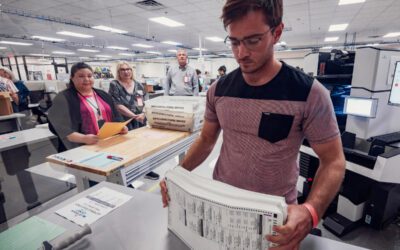
Sen. Christine Marsh is running for reelection to the state Senate in Arizona's 4th Legislative District. Photo courtesy Arizona Democratic Legislative Campaign Committee.
State Sen. Christine Marsh wore mock combat boots to work on the night of June 15, when Arizona’s lawmakers passed a $17.2 billion budget. It was her way of protesting the combative nature of her work.
Republican control of both the Arizona House and Senate means that bills to support public schools, improve health care, preserve water supplies, and fight the opioid crisis aren’t even reaching the floor for a vote, Marsh says. But she hopes the stalemate will ease after November, when Arizona voters get the chance to restore balance to state government.
Should Democrats gain the majority or even have a tie, she says, “I do think we’ll be able to get some good things across the finish line. We will be able to mitigate the water crisis and further mitigate the opioid crisis, and we could do a whole lot more with the housing crisis which leads to homelessness. I think we could get a lot of good policies through that the vast majority of Arizonans care about.
Marsh recently spoke to The Copper Courier about her two terms in the Senate and her hopes for a third. The following interview has been edited for brevity and clarity.
Copper Courier: In 2016, after three decades in the classroom, you were named Arizona’s Teacher of the Year. Then in 2017, you decided to run for the state Senate. Why the career change?
Christine Marsh: About six months before I decided to run, one of my high school students asked me if kids in Arizona were worth less than kids in other states. At that point we were funded last in the nation, and he said that must mean [Arizona kids] were worth less than other kids.
That’s the kind of conversation that doesn’t leave you. It really was like being punched. Then, about six months later, the then-minority party leader in the House pulled me aside and said, “You need to run for the state Senate.”
I said, “You’re crazy; I’m a full-time teacher,” and I said no for about six weeks until I realized that, if I really did care about students, it was incumbent on me to do everything in my power to help. That was March of 2017.
CC: Arizona currently ranks 49th in the country in spending on students. Why?
CM: We have among the largest class sizes, the lowest teacher salaries, the lowest per-student funding, and on and on and on. But we didn’t just find ourselves at the bottom. This was [the result of] a bunch of choices that were made.
I think part of it has been privatizing public education as much as possible, and we’ve certainly seen this in Arizona with the universal voucher system.
We cannot further disinvest in our public schools. I’m in the minority party, but I’ve been at the forefront of ensuring that as many resources as possible go into public education, and it’s work that is often very much behind the scenes. In the last budget, education took a teeny bit of a hit, and it could have been so much worse that I count it as a success.
CC: What accomplishment are you most proud of in your two terms as state senator?
CM: Definitely it was the legalization of fentanyl testing strips. Having our former governor [Doug] Ducey sign that into law was a big moment.
CC: Fentanyl poisoning has become the chief cause of death among adults aged 18 to 45, with an American dying about every five minutes. This battle was personal for you, right?
CM: Four years ago, my son Landon died after taking a single Percocet pill that was laced with fentanyl. He was a newlywed and an engineering student and not addicted. He didn’t even take allergy pills.
I have no doubt Landon would want his death not to be in total vain, so whenever I get the opportunity to talk about it, I make sure to remind people that the days of experimenting with drugs are gone. We are in a time in our society where one pill is too many. Unfortunately, all too often that one pill results in death because that pill is laced with fentanyl.
Four years after his death, I’m grateful I can talk about this without crying. I’ve been surprised how often the issue comes up when I knock on doors [to contact prospective voters at their homes], which means that a lot of people are suffering, and this has to be more common than anyone realizes.
We’ve really got to do the legwork to destigmatize these issues and get people talking about them. That is going to create a better path to healing, and I’m talking about healing on a societal level.
CC: The state legislature recently overturned that notorious 1864 state ban on abortion. What are the chances that Arizona may vote for a constitutional right to abortion in November?
CM: I do think we will see that on the ballot. This cuts across party lines, as I’ve seen while knocking on doors. There was one man who said, “I’m not politically engaged but I know reproductive rights are very important to my wife.”
He didn’t have issues of his own. But this was important to his wife, so this was his message to me.
CC: A recent poll showed that 60% of state voters think political candidates—and, presumably, elected officials—are ignoring their signal issues, including health care, public safety, and education. Just how frustrating is it for you that it’s so hard to get things done on those issues in the state legislature?
CM: I’m a pretty moderate voice. I represent 22,000 more Republicans than Democrats, and I respect that. I don’t want them to be disenfranchised. But for two years in a row, I’ve tried to run a basic bill [SB 1356] to just require fingerprints of any employee who deals with children at a private school that is accepting public dollars.
Voters are stunned that it’s not getting a hearing. It’s a question of safety for kids.
I’m very hopeful that in November we’ll be able to pull off a tie if not flip a chamber or two. But I don’t think there’s anything that can be done with the current majority party. And it’s really not alright for my constituents to be disenfranchised like this.
Meanwhile, I’m an optimistic person and a hopeful person, and I find this to be meaningful work. I love when a constituent emails in with a problem and we can solve it or at least help in some ways. Almost always, we’re able to make individual constituents’ lives a little easier, and that I find to be really meaningful.

Republican Rep. Juan Ciscomani wins reelection to Arizona US House seat
Juan Ciscomani won his first term in 2022 when he beat Kirsten Engel by over 5,200 votes. PHOENIX (AP) — Republican Rep. Juan Ciscomani won...

No, Elon Musk did not hack Arizona’s election results with Starlink
Only three Arizona counties use Musk's Starlink, and two of them voted for Kamala Harris. As President-elect Donald Trump begins filling key posts...

Why AP called the US Senate race in Arizona for Ruben Gallego
The AP only declares a winner—in this case, Ruben Gallego—once it can determine that a trailing candidate can’t close the gap and overtake the vote...

Women have led other democracies, but US voters rejected the 2 who tried—what will it take to elect a female president?
In the United States, 45 men have served as president, starting with George Washington in 1789. Donald Trump’s reelection extends that streak....




